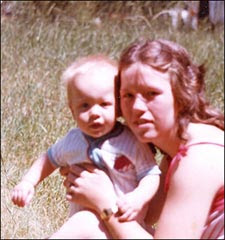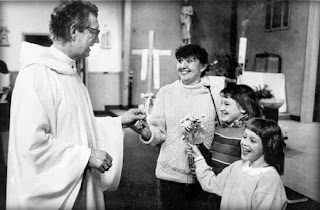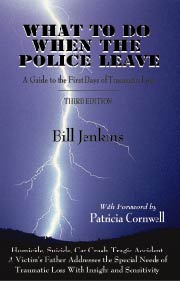
27 year old Rebecca Spencer, mother of two, stabbed 58 times by the teen serial killer. Pictured with her son Steven.
Killed by the same 13 to 15 year old serial killer:
In July 1987, 27-year old Rebecca Spencer was found stabbed to death in her living room. She had been stabbed repeatedly with a packing knife. Sadly, at the time of her death, she was preparing to move to another neighborhood.
The killer used a weapon that was already present which indicated the killer originally entered the house for another purpose, robbery. Spencer startled her killer. The case was an unusual display of “overkill.” Spencer was stabbed more than 60 times.
Two years later, on September 4, 1989, Marie Bouchard hadn’t heard from her daughter Joan Heaton 39, and her two grandchildren over the Labor Day Weekend, which was unusual. Marie’s other daughter Mary Lou accompanied her to Joan’s house.
When they entered the home, they saw the interior splattered with blood, as they walked further into the residence, they saw Joan lying beneath blood-soaked sheets in the hallway. Her oldest daughter Jennifer was lying nearby and Melissa was on the kitchen floor.

Joan Heaton, with her 10 year old daughter Jennifer and her 8 year old daughter Melissa, all victims of a teenage serial killer
Seasoned detectives were shocked at the brutality of the crimes and had difficulty holding back tears. All the victims had been stabbed numerous times (overkill) with kitchen knives. The youngest child Melissa; was stabbed so hard, one of the blades broke off in her neck and she also had her skull bludgeoned in with a kitchen stool. Her mother Joan had 57 stab wounds inflicted on her body. She was also bludgeoned and strangled.
News of the triple homicide sent chills and shock waves through the quiet community of Warwick, Rhode Island. No one felt safe and the residents looked to the police for answers.
FBI profiler Gregg McCrary noticed similarities in both cases. For instance, both cases showed an unusual display of “overkill.” Joan and Rebecca were stabbed approximately 60 times each and the children approximately 30 times. He theorized, due to the excessive nature of both crimes, it was highly probable that the same person committed the murders. The offender was later arrested and incarcerated. He has stabbed a prison guard while incarcerated.
A Story about the victims families work in the aftermath of their murders
Some relatives of Craig Price’s victims have made something productive from their pain
Becky Spencer’s 1987 murder drove her mother into God’s arms.
The killing of Joan Heaton and her daughters in 1989 turned Joan’s mother and two sisters into Rhode Island victims’ rights activists.
Years after the crimes, members of each family are now doing what they never thought possible.
About eight years ago, Delores M. Ratliff took the advice of friends, and dragged her despair over her daughter’s death to the First Christian Church of Earlington, Ky.
She says, “I was saved there.”
There, in a red-brick church with arched windows and all sorts of peaks and gables, Ratliff came to forgive Craig Price for killing her daughter Becky.
“If you keep hating and hating,” she warns, “it turns you into a bad person.”
Ratliff is a Rhode Island native. She moved to Western Kentucky with her husband in 1973, the year Craig C. Price was born in Cambridge, Mass.
As a 13-year-old in 1987, Price murdered Ratliff’s daughter from a previous marriage, Rebecca Spencer, a divorced mother of two who lived two doors from Price on Inez Avenue in Warwick’s Buttonwoods neighborhood. The crime went unsolved for more than two years.
“It hasn’t been easy,” Ratliff says in a calm voice. “I still can’t believe she’s gone. I have her pictures up around the house. I don’t put them away. I talk to her every night.”
Rebecca’s birthday was on Dec. 1. Ratliff still finds the date hard to face every year. “You never expect your daughter to leave before you.”
Ratliff is 68. She lives in Madisonville, Ky., with her husband, Rudolph W. Ratliff, to whom she has been married for 30 years. “You couldn’t ask for a better man.”
Rudolph Ratliff has cancer. Delores says she soon will lose him, too.
Friends had urged her around 1996 to go to First Christian Church, about four miles from her home, because she was “real down.”
She was baptized at First Christian, and discovered new faith.
“It changed my outlook. I know that my daughter was saved.”
She also changed how she thought of Craig Price.
“I have forgiven him,” she says. “I pray for someone to help him. I couldn’t accept my daughter’s death without that. When I joined that church, I recognized the hate that I was holding.
“I don’t want anyone to do anything harmful to him. My thoughts are that he’s sick and needs help. I really feel sorry for him because somebody should have helped him.
“I don’t want him on the streets, I want him helped. I’m a Christian and I forgive everyone, but I don’t think he should ever be let out. I pray that if he can’t be helped, that he’s never let out. I don’t want anyone else to have to go through what we went through.”
She feels terrible for the family of Joan Heaton. Price murdered Heaton and her daughters, Jennifer and Melissa, 26 months after he killed Rebecca Spencer. She believes Price should have been caught and stopped after Becky was killed. “He only lived two doors down.”
Nearly 17 years after her daughter’s murder, the memories can still hurt, she says, but they cannot break her. In her faith, she has discovered strength.
“You’d be surprised at what the Good Lord will give you when you need it.”
She says she never would have imagined that she’d have the strength to care for her husband at home in the last months of his life.
“But he’s here, he’s at home,” she says. And she is determined that her husband remain at their home, in her care, until the moment that God decides otherwise.
WHAT HAS become of Joan Heaton’s family since her death?
“We’ve become stronger,” says Gail Vakalis, Joan’s sister. “We’ve become fighters. We’ve become fighters for other people.”
They have become involved in the Rhode Island Victims’ Advocacy & Support Center, a nonprofit agency that provides services to families affected by homicide and violent crime.
No such group existed locally when Joan Heaton and her daughters were murdered 15 years ago.
Marie Bouchard, Joan Heaton’s mother, is currently on the Rhode Island agency’s board. Vakalis and another of Joan’s sisters, Mary Lou Bouchard, have been active volunteers for years, says the agency’s director, Anne Marie D’Alessio.
D’Alessio calls Joan Heaton’s family “pioneers in victims’ rights,” and refers to Marie Bouchard as “my heroine.”
Joan’s family is helping D’Alessio coordinate the Rhode Island portion of a national effort to amend the U.S. Constitution to protect the rights of victims of violent crime.
Under the proposed amendment, victims would have “the right to reasonable and timely notice of any public proceeding involving the crime,” the right to be involved in “public release, plea, sentencing, reprieve or pardon proceedings,” and the right to “adjudicative decisions that duly consider the victim’s safety, interest in avoiding unreasonable delay and just and timely claims to restitution from the offender.”
“This is another instance where we’re trying to improve the rights of victims,” Vakalis says.
The Victims’ Advocacy & Support Center is pushing Rhode Island legislation, pending in the General Assembly, to add a 10-percent tax to all items bought from the prison commissary, to benefit the Criminal Injuries Compensation Fund, D’Alessio said. The group is also behind legislation to allow crime victims to sue if they do not receive the full protection of all victims’ rights laws.
Through her work on behalf of victims, Vakalis has made something productive from the pain of her sister’s murder.
“I didn’t think it right to dwell on the pain in a negative way, and I know there are other people who need to know that you can get past what seems an insurmountable challenge,” she says.
She could never escape the reminders of the crime — her oldest daughter was between Jennifer and Melissa Heaton in age. Whenever her daughter celebrated a milestone of life, such as graduation, Vakalis was reminded of Melissa and Jennifer.
Joan and her daughters were buried on Vakalis’ birthday, in September. “Every year,” she says, “I am reminded.”
Vakalis is troubled that the Heaton murders are still such a public fascination. “The past 15 years, there have been many, many other murders. But this is still the one people dwell on. Why does this have to be a topic of interest? Other families are suffering, too.”
She had come to think of Craig Price as a “waste of a person” because he had never before shown remorse, she says. “He’s still the same-old ‘poor me, I’m being persecuted.’ I think that’s kind of ironic.”
The family was unmoved by Price’s apology in court in 1997; they didn’t think he had been sincere.
What about forgiveness?
Vakalis says, “That’s an individual thing.”
She has found it for Price.
Others in her family have not.
Her sister Mary Lou, who discovered the bodies in Joan’s home, “probably won’t be able to forgive,” Vakalis says. “I understand that.”
“My daughter will never forgive because [Jennifer and Melissa] were like siblings to her. Everybody has their own coping mechanism. Maybe keeping that pain keeps them alive for her. I tend to think that they are in a better place.”
Like Delores Ratliff, Vakalis is able to do things today she might not have years ago — such as media interviews.
She gives one more example:
Anne Marie D’Alessio is the first person the police notify by pager when there is a murder, to get services to the victim’s family as soon as possible, she says.
When D’Alessio went away four days last year, she entrusted Vakalis with her pager.
“I was ready to take that page in the middle of the night and go out and do what I had to do. Maybe 15 years ago that wouldn’t have been something I could have done.”
Learn more about the killer here:











